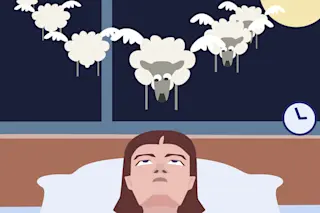Middle-agers and seniors on average sleep less than younger people, about 6 to 7 hours a night compared to 8 to 9 hours.
But why is this so? And are older people therefore sleep deprived, which can give rise to chronic maladies and speed up aging?
There are two camps on this. One is that older people sleep less because their body requires less sleep. No harm, no foul here. The other is that the hours spent sleeping isn’t the relevant question; what matters is the quality of sleep. And according to a recently published review called “Sleep and Human Aging,” by researchers at the University of California, Berkeley, many older people have unhealthful sleep due to age-related physiological changes. These changes can begin as early as the 30s.
A vicious cycle emerges, the researchers say: The older we get, the more our ability for restorative sleep erodes, which speeds ...














